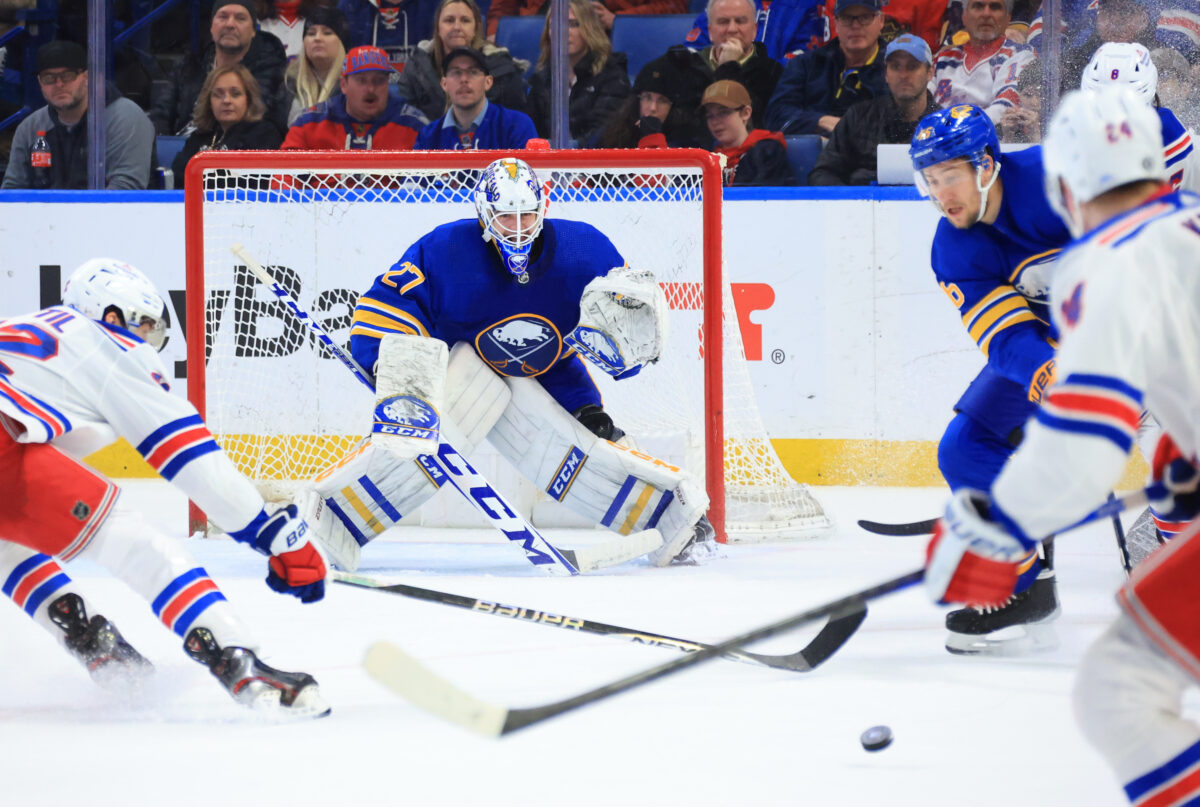Last season, Devon Levi had an impressive seven-game audition with the Buffalo Sabres and did enough to earn himself the starting job for the Sabres to begin the 2023-24 campaign. Levi is a top prospect, but becoming a starting goalie in the NHL immediately out of college is relatively unheard of. We should expect growing pains, especially playing for a team with defensive deficiencies. Levi’s first couple of weeks have been a mixed bag, but there are things the Sabres can do to make his adjustment smoother.
Devon Levi Through Two Weeks
Last season, in seven games, Levi had better numbers than the other three goalies on the Sabres’ roster. He posted an impressive 3.1 goals saved above expected (GSAx). He stopped nearly half a goal per game more than expected. It’s still early in 2023-24, but Levi hasn’t recaptured that level of success yet. His GSAx of -1.2 is far from disastrous, but it suggests his performance has been in the bottom half of the league.
GSAx is a good measurement because it takes shot quality into account. However, some argue that teams that give up many high-danger chances make goalies appear worse under this metric. There’s a mental and physical fatigue that comes with constantly being under siege. So, should the Sabres’ defense be blamed for Levi’s inconsistent start? Partly, yes. But it’s not that simple.
While Buffalo still gives up more high-danger chances than most teams, they are closer to the middle of the pack early in 2023-24. Last season, they gave up the 10th most high-danger shots and fifth most medium-danger ones. This season, they have kept a higher percentage of attempts to the perimeter, so Levi’s problems haven’t necessarily come from facing too many high-danger chances. There’s more at play here.
Devon Levi’s Rebound Control
Levi’s lack of rebound control was apparent early in his NHL career. In 2022-23, he gave up the eighth most rebounds above expected of all NHL goalies. In his first four starts this season, 23% of his goals against have been off rebounds. The NHL average is typically between 15 and 20%. This problem isn’t unique to Levi; the puck tends to pinball off inexperienced goalies and stick to more experienced ones. Levi’s athleticism and technique allow him to stop many high-danger chances, but when teams throw perimeter shots into the pads, they will likely get a rebound. If the Sabres want to give him the best opportunity to succeed, they need to do a better job of protecting the front of the net while Levi is still learning to swallow up more shots.

This game-tying goal for the Tampa Bay Lightning against the Sabres is a perfect example of this.
Rasmus Dahlin lunges below the goal line to rim the puck away, but Brayden Point intercepts it and throws it on net. Tage Thompson fails to pick up Brandon Hagel, leaving the Sabres outnumbered 2-1 in front of the net. The puck pops off Levi’s pads, and the disadvantage around the crease results in a rebound goal. The Lightning put as many pucks on net as possible, trying to tie the game late. Levi fails to freeze the puck, and the Sabres do a poor job protecting the net, which leaves them vulnerable. Buffalo has plenty of size, and they will need to use it more as the season goes along if they want to maximize Levi’s chances at success.
Related: Sabres Expectations for Devon Levi as a First-Year Starter
Hopefully, Levi will quickly learn how to gobble up more pucks. If it becomes a long-term problem, the Sabres should consider acquiring players who excel at clearing the front of the net, but this ultimately needs to be a team effort. Tying up sticks and maintaining body position in front of the net should be their top priority in the defensive zone. They have already shown signs of improvement in preventing the grade-A chances. They need to keep that going while stopping the perimeter shots from becoming dangerous follow-up opportunities.
Levi’s Start Should Not Be a Major Concern for Buffalo
If anyone thought a 21-year-old college goaltender would seamlessly transition into an NHL starter, they were being naïve. Levi has all the tools to become a successful No. 1, but he needs to work out some of the kinks. The sooner the Sabres can recognize and account for his deficiencies, the sooner they will see results. Ultimately, Levi has only allowed one more goal than expected. The wins will come when they start giving him more run support.
